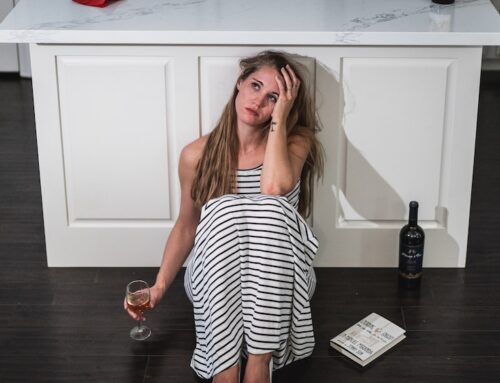Mommy Doesn’t Need Wine: The Stigma of Being a Sober Mother…From The Fix
By Claire Gillespie
“I’ve always wanted to film the real ‘after party’ when the mom is passed out with her little kid in the background, or she gets into her car and drives drunk. It happens all the time.”

The media makes tons of money marketing alcohol to moms, playing on the difficulties of being a mom and offering alcohol as the only solution to stress.
When I made the decision to quit drinking, one morning in June 2017 when my relentless hangover was surpassed only by my anxiety and self-loathing, I didn’t think about how sobriety would affect my role as a parent beyond the obvious positives: less time nursing a glass of wine and more time to engage with my kids; a clearer morning mind during the pre-school madness; more patience, less irritability. More money.
What I didn’t consider was my exclusion from the Mommy Needs Wine club. Although exclusion isn’t the right word – it was my choice to leave. I just hadn’t realized how significant a part of my life it was until I canceled my subscription.
When I first became a mother in 2007, I quickly realized there was an unwritten rule, one that was never mentioned in the parenting manuals: being a mother is hard, and wine (or gin, or vodka, or whatever your particular poison is) makes it easier.
At that point, I didn’t yet have a Facebook account, and Instagram wasn’t even a thing. Today’s pervasive social media culture gives the Mommy Needs Wine club even more power. It recruits mothers from their Facebook and Instagram feeds, via memes that declare: “The most expensive part of having kids is all the wine you have to drink” and “I can’t wait for the day when I can drink with my kids instead of because of them.” We’re encouraged to buy baby onesies emblazoned with “I’m the reason Mommy drinks” and prints saying “Motherhood. Powered by love. Fueled by coffee. Sustained by wine” (to put in a pretty frame and display on your wall, lest anyone should forget how crucial booze is to parenting).
“The media makes a ton of money marketing alcohol to moms, playing on the difficulties of being a mom and offering alcohol as the only solution to stress,” said Rosemary O’Connor, certified life and addiction coach and author of The Sober Mom’s Guide to Recovery. “I’ve always wanted to film the real ‘after party’ when the mom is passed out with her little kid in the background, or she gets into her car and drives drunk. It happens all the time, yet it seems so harmless because wine is so much a part of our culture.”
It’s so much a part of our culture that the Moms Who Need Wine Facebook page is liked by over 726,000 people; that the memes and baby onesies and wall prints are promoted by thousands of likes, shares and crying-with-laughter-face emojis; that even celebrity moms are in the club. Kelly Clarkson said in a January 2018 interview, “[Kids] are challenging. Wine is necessary.” And millions of mothers around the world raised a glass.
The truth is, this alcohol-dependent culture—if you don’t drink you’re boring, judgmental, not to be trusted (Winston Churchill and his quote “Never trust a man who doesn’t drink” have a lot to answer for)—and the ensuing stigma around sobriety are far from harmless. Between 2006 and 2014, alcohol-related emergency room visits soared among women, according to a study published in January 2018 in the journal Alcoholism: Clinical and Experimental Research. A study published in the International Journal of Drug Policy in May 2015 found that a significant number of mothers said drinking helped them “assert their identity” as something other than that expected of a woman in early midlife. Mothers with young children told researchers the “transformative effects” of “excessive drinking” let them to revert, for a short time, to their younger, more stress-free selves.
When I started to share my sobriety with friends and family, I received varying reactions. Many people were supportive, some stopped inviting me to parties, and the vast majority were surprised. Not just surprised that I—always the first to suggest a glass of prosecco, always the last to leave a party—was the person who had publicly declared my commitment to sobriety, but surprised that I could even contemplate being a parent without booze. How was I going to get through a challenging day with my kids without the promise of a few glasses of wine to take the edge off? How was I going to reward myself for surviving another week of homework, messy bedrooms, mini rebellions and Xbox arguments if I wasn’t going to do it with wine?
Back then, I had no answers to those questions. I was simply concentrating on getting through one sober day at a time. That was enough of a reward. What I needed was support and encouragement, not interrogation.
And then there was the pity. It came in various forms, from the “Oh, you must be so bored?” on one of my first sober nights out, complete with sympathetic head tilt (for the record, I wasn’t bored until I was asked that question) to the barefaced “I feel sorry for you!” at my first sober wedding. The pity was worse than the perplexity and the cross-examination, because it came with a “but.” But this is your choice. But you’re not an alcoholic, are you? (Because alcoholics have to be homeless, jobless, friendless losers.) But you won’t die if you have a drink, will you? But you could just have one, right? People didn’t feel sorry for me the way you feel sorry for someone with a broken leg. Their faux-pity made me feel guilty. It made me question my decision, not because I didn’t think it was the right decision, but because it was a decision that excluded me from so much. I didn’t fit into the drinking culture the other parents in my social circle celebrated and depended on, so where the hell did I fit in?
O’Connor had a similar experience when she stopped drinking. “People who I thought were my ‘best friends’ stopped calling and inviting me to parties,” she said. “When I was newly sober, the feelings of not being included was one of the most difficult realities to face. Being newly sober, going through a divorce, and having people abandoning me was so painful. I found out who my real friends were and they are still my friends today.”
Now, with over a year of sobriety under my belt, I feel differently. I’m proud of my decision and the strength it’s taken to get to this point, to stay sober at parties and weddings and nights out when everyone else is getting drunk, and, sometimes, to stay home and miss those occasions because protecting my sobriety is more important than worrying about what anyone else thinks. I’ve also realized that in most cases, how people react to my sobriety has actually nothing to do with me, and everything to do with their own issues with alcohol.
O’Connor agrees. “I realized that when I was drinking I never wanted to hang out with non-drinkers because it made me self-conscious about my own drinking,” she said.
It’s difficult to talk about alcohol dependency with a group of friends who’re all knocking back wine while you’re working your way through the mocktail menu. But it’s a conversation that needs to be had. How many mothers are functioning alcoholics or have alcohol dependency issues, but don’t know this because our culture tells them—repeatedly—that drinking is the answer?
I’m no prohibitionist. (I say that so often I should have it tattooed on a prominent body part.) But I do believe that we need to question the media messages we receive about alcohol. If not for ourselves, then for our kids.
“Parents of young children need to be aware that when they place themselves on the slippery slope to alcohol use disorder by frequently exceeding recommended drinking limits, they place their young children on that slope, too,” warned George F. Koob, Ph.D., director of the National Institute on Alcohol Abuse and Alcoholism. “We know that young children learn from watching what their parents do and not just from what they say. The children of parents who are heavy drinkers are more likely to become heavy drinkers themselves and develop an alcohol use disorder than the children of moderate drinkers or abstainers.”
I see my kids benefiting from my sobriety—in countless little ways, every single day. A lengthy bedtime story because I’m not counting the minutes down to wine o’clock. A relaxed morning before school because I’m not hungover, sleep-deprived and snappy. A healthier model for how to administer self-care. A lesson on how to question cultural norms and why, sometimes, taking the road less traveled is the most rewarding journey of all.

